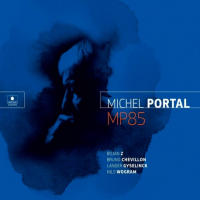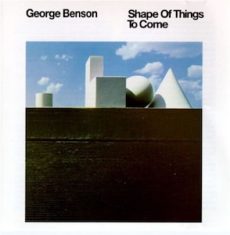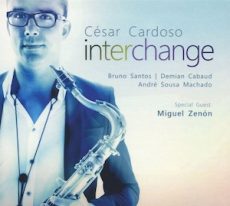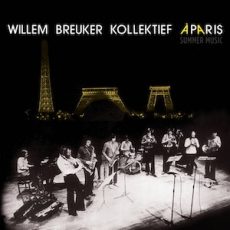
Daily Dose Of Jazz…
Michel Portal was born on November 27, 1935 in Bayonne, France into a musical family and home filled with several instruments growing up. His interest in jazz began after hearing it on the radio after World War II. He studied clarinet at the Conservatoire de Paris and conducting with Pierre Dervaux.
Gaining experience in light music with the bandleaders Henri Rossotti and with Perez Prado in Spain in 1958, Michel performed with drummer Benny Bennett, Raymond Fonsèque, Aimé Barelli and for many years, the singer Claude Nougaro.
Portal co-founded the free improvisation group New Phonic Art. During 1969, he played on a recording of Karlheinz Stockhausen’s Aus den sieben Tagen.
He began scoring music for films in the 1980s. He won the César Award for Best Music Written for a Film three times. Playing both jazz and classical music and is considered to be “one of the architects of modern European jazz.
Composer, saxophonist, and clarinetist Michel Portal continues to perform and record.
More Posts: bandleader,clarinet,composer,history,instrumental,jazz,music,saxophone

Daily Dose Of Jazz…
Wayne Andre was born on November 17, 1931 in Manchester, Connecticut. His father was a saxophonist, and he took private music lessons from age 15. In the early 1950s he played with Charlie Spivak before spending some time in the U.S. Air Force. 1955 saw him joining the Sauter-Finegan Orchestra, and the next year played with Woody Herman.
From 1956 to 1958 Wayne played with Kai Winding and enrolled at the Manhattan School of Music. He composed his Nutcracker and arranged The Preacher for the Kai Winding Septet while performing with the septet. In the 1960s, he performed with Gerry Mulligan’s first Concert Jazz Band, the Thad Jones/Mel Lewis Orchestra, and Clark Terry’s Big Band.
He joined the Mission to Russia with Benny Goodman in 1962. He also played with Urbie Green, Art Farmer, Roy Ayres, and Carl Fontana. After settling in New York City, Andre became a sought-after studio sideman and soloist. He has recorded with Liza Minnelli, Bruce Springsteen, and Alice Cooper.
During the Eighties he played with Lynn Welshman’s Tentet, The Mingus Big Band, The Epitaph Band, Jaco Pastorius and many others. He performed with his own quintet, which included Marvin Stamm, Pat Rebillot, Ronnie Zito, Jay Leonhart; and his septet which included Matt Finders, Keith O’Quinn, and Jim Pugh. Andre performed with his own big band, the Illinois Jacquet Band and Mike Longo’s New York State of the Art Jazz Ensemble.
Wayne Andre, who recorded one hundred and sixty-seven albums as a studio musician, continued to write music for symphony orchestras and big bands throughout his life, died on August 26, 2003..
More Posts: history,instrumental,jazz,music,trombone

Daily Dose Of Jazz…
César Cardoso was born on November 10, 1982, in Leiria, Portugal. At only seven years old he dedicated his time to studying music, From 2004 to 2008 he studied at Hot Clube de Portugal’s Jazz School, where he had lessons with Jorge Reis and Pedro Moreira and started to distinguish himself as a jazz musician. 2008 had him enrolled at Escola Superior de Música de Lisboa, where he continued to work with Jorge Reis and Pedro Moreira. Completing a Jazz Bachelor Degree in saxophone performance, he became a member of the dixieland group Desbundixie with whom he recorded Kick’n Blow in 2007 and Up 2 Nine in 2009.
In 2010, César recorded his debut, Half Step, with his quintet at that time followed with a second album, Bottom Shelf, was released five years later in Hot Clube de Portugal, and features his original music this time written for His third album Interchange, was recorded with special guest, Miguel Zenón on alto saxophone.his quartet. His fourth album, Deice of Tenors, is a large ensemble recording.
He published the book Teoria do Jazz (Jazz Theory), with Chiado Editora, the first book ever written in Portuguese about the theoretical bases of Jazz, thought through to serve as a handbook for jazz students. His second book, a complement of the first, is titled Teoria do Jazz – Exercícios. Cardoso has composed and arranged for big bands, such as the Orquestra Jazz de Leiria and the Orquestra do Hot Clube de Portugal.
Saxophonist César Cardoso has won awards, became the first Portuguese musician to become an Artist Henri SELMER Paris, completed his PhD in Music and Musicology, and continues to perform, compose, arrange and teach at the Universidade de Évora in the Jazz degree program and is the pedagogical director of Escola de Jazz de Leiria.
More Posts: bandleader,history,instrumental,jazz,music,saxophone

Daily Dose Of Jazz…
César Cardoso was born on November 10, 1982, in Leiria, Portugal. At only seven years old he dedicated his time to studying music, From 2004 to 2008 he studied at Hot Clube de Portugal’s Jazz School, where he had lessons with Jorge Reis and Pedro Moreira and started to distinguish himself as a jazz musician. 2008 had him enrolled at Escola Superior de Música de Lisboa, where he continued to work with Jorge Reis and Pedro Moreira. Completing a Jazz Bachelor Degree in saxophone performance, he became a member of the dixieland group Desbundixie with whom he recorded Kick’n Blow in 2007 and Up 2 Nine in 2009.
In 2010, César recorded his debut, Half Step, with his quintet at that timefollowed with a second album, Bottom Shelf, was released five years later in Hot Clube de Portugal, and features his original music this time written for His third album Interchange, was recorded with special guest, Miguel Zenón on alto saxophone.his quartet. His fourth album, Deice of Tenors, is a large ensemble recording.
He published the book Teoria do Jazz (Jazz Theory), with Chiado Editora, the first book ever written in Portuguese about the theoretical bases of Jazz, thought through to serve as a handbook for jazz students. His second book, a complement of the first, is titled Teoria do Jazz – Exercícios. Cardoso has composed and arranged for big bands, such as the Orquestra Jazz de Leiria and the Orquestra do Hot Clube de Portugal.
Saxophonist César Cardoso has won awards, became the first Portuguese musician to become an Artist Henri Selmer Paris, completed his PhD in Music and Musicology, and continues to perform, compose, arrange and teach at the Universidade de Évora in the Jazz degree program and is the pedagogical director of Escola de Jazz de Leiria.
More Posts: bandleader,history,instrumental,jazz,music,saxophone

Daily Dose Of Jazz…
Willem Breuker was born on November 4, 1944 in Amsterdam, Netherlands. During the mid-1960s, he played with percussionist Han Bennink and pianist Misha Mengelberg. He co-founded the Instant Composers Pool (ICP) with which he regularly performed until 1973. He was a member of the Globe Unity Orchestra and the Gunter Hampel Group.
In 1974 Willem led the 10-piece Willem Breuker Kollektief, which performed jazz in a theatrical and often unconventional manner, drawing elements from theater and vaudeville. They toured Western Europe, Russia, Australia, India, China, Japan, the United States, and Canada. In 1974, he founded the record label BV Haast. Beginning in 1977, he organized the annual Klap op de Vuurpijl (Top It All) festival in Amsterdam.
Haast Music Publishers, which he also operated, published his scores. In 1997, he produced with Carrie de Swaan Componist Kurt Weill, a 48-hour, 12-part radio documentary on the life of Kurt Weill. In 1999, BV Haast published the book Willem Breuker Kollektief: Celebrating 25 Years on the Road, which includes two albums.
Bandleader, composer, arranger, saxophonist, and clarinetist Willem Breuker, who was knighted with the Order of the Netherlands Lion, died from lung cancer on July 23, 2010 in Amsterdam.
More Posts: arranger,bandleader,clarinet,composer,history,instrumental,jazz,music,saxophone


